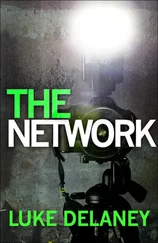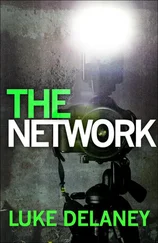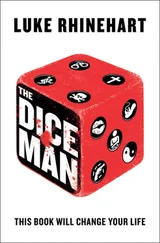Luke Rheinhart - The Diceman
Здесь есть возможность читать онлайн «Luke Rheinhart - The Diceman» весь текст электронной книги совершенно бесплатно (целиком полную версию без сокращений). В некоторых случаях можно слушать аудио, скачать через торрент в формате fb2 и присутствует краткое содержание. Жанр: Современная проза, на английском языке. Описание произведения, (предисловие) а так же отзывы посетителей доступны на портале библиотеки ЛибКат.
- Название:The Diceman
- Автор:
- Жанр:
- Год:неизвестен
- ISBN:нет данных
- Рейтинг книги:3 / 5. Голосов: 1
-
Избранное:Добавить в избранное
- Отзывы:
-
Ваша оценка:
- 60
- 1
- 2
- 3
- 4
- 5
The Diceman: краткое содержание, описание и аннотация
Предлагаем к чтению аннотацию, описание, краткое содержание или предисловие (зависит от того, что написал сам автор книги «The Diceman»). Если вы не нашли необходимую информацию о книге — напишите в комментариях, мы постараемся отыскать её.
The Diceman — читать онлайн бесплатно полную книгу (весь текст) целиком
Ниже представлен текст книги, разбитый по страницам. Система сохранения места последней прочитанной страницы, позволяет с удобством читать онлайн бесплатно книгу «The Diceman», без необходимости каждый раз заново искать на чём Вы остановились. Поставьте закладку, и сможете в любой момент перейти на страницу, на которой закончили чтение.
Интервал:
Закладка:
`Father Wolfe.' says Mrs. W. in a high-pitched voice.
`My turn?'
[Image of round, red-faced blond-haired Father Wolfe, looking at first uncertainly off toward Mrs. W., then staring into the camera like a prosecuting attorney.]
`Thank you. The religion of the Die is, no matter how Dr. Rhinehart may try to weasel out of it this afternoon, the worship of the Antichrist. There is a moral law, er, a moral order to the universe which God created, and the surrender of one's freewill to the decisions of dice is the most outrageous and complete crime against ah God that I can imagine. It is to surrender to sin without raising a fist. It is the act of a ah coward.
`Cop-out is too mild a word. The religion of the Die is a crime, against ah God and against the dignity and grandeur of man created in ah God's image. Free will distinguishes man from ur God's other creatures. To surrender that gift may well be that sin against the Holy Spirit which is unforgivable. Dr. Rhinehart may be well educated, he may well be a medical doctor, but his so-called er religion of the Die is the most unh poisonous, unh obnoxious and satanic thing I have ever heard of ah.'
`May I comment on that?' says R.'s voice from off-screen, and his image appears, wordless and relaxed, staring out, obviously not intending to speak a single further word. It is as if the channel had been switched every time his face appears on the screen.
Five, seven, eight, ten seconds pass.
`Dr: Dart,' says a subdued female voice.
Dr. Dart appears, young, dynamic, handsome, cigarette smoking, nervous, intense, brilliant.
'I find Dr. Rhinehart's performance today rather amusing, and perfectly consistent with the clinical picture I have formed of him through a reading of his work and through discussions with people who have known him. We can't understand the religion of the Die and the peculiar way it is a cop-out unless we can understand the pathology of its creator and of its followers. Basically, as Dr. Rhinehart himself has acknowledged, he is a schizoid. [The image on the screen becomes that of Dr. Rhinehart, benignly looking at the viewer, and remains through the next part of Dr. Dart's analysis.]
Dr. Rhinehart's alienation and anomie apparently reached such a degree that he lost a single identity and became a multiple personality. The literature is full of case studies of this schizoid type, and he differs from the typical case only in the large number of personalities he is apparently able to adopt. The compulsive nature of this role playing is masked by the use of the dice and by the mumbo-jumbo religion of the Die created around it. The pathological pattern of alienation and anomie is common in our society, and the significant number of people influenced by the religion of the Die manifests the appeal of a verbal structure to mask and support the psychological disintegration which has taken place. [Image of Dr. Dart reappears.] 'The religion of the Die is not so much a cop-out as it is, like all religions, a comforter, a confirmation and, one might say, an elevation of the psychological debilities of the individual who embraces the religion. Passivity before the rigid God of Catholicism or Judaism is one form of cop-out, passivity before the flexible and unpredictable God of chance is another. Both can be understood only in terms of individual and group pathology.'
Dr. Dart turns back to Mrs. Wippleton. Her image appears, serious and sincere.
'What kind of nonsense is that about the rigid God of Judaism?' says Rabbi Fishman's voice from off-screen. 'I'm just reporting commonly accepted psychological theory,' Dart answers.
'If anything is pathological,' says Rabbi Fishman darkly from the screen again, 'it's the sterile pseudo-objectivity of neurotic psychologists pretending to understand spiritual man.'
'Gentlemen,' interposes Mrs. Wippleton with her best smile.
`Catholicism is not the elevation of man's debilities [comes Father Wolfe's 'voice and then face] but of his spiritual grandeur. It is the insect minds of psychologists.'
'Gentlemen'
'Your defensiveness interests me,' says Dr. Dart.
`Our subject today,' interposes a beaming Mrs. Wippleton, 'is the religion of the Die and I for one am anxious to hear what Dr. Rhinehart has to say about the charge that his religion is schizophrenic and pathological.'
[The image of Dr. Rhinehart appears, glowing, friendly, relaxed: Five seconds. Six.] 'I don't understand your silence, Dr. Rhinehart,' says Mrs. Wippleton from off-screen. Not a flicker of change in R.
`This is a typical symptom, Mrs. Wippleton,' says Dr. Dart's voice, 'of the schizophrenic in the catatonic state. Dr. Rhinehart is apparently capable of going in and out of such states almost at will, a most unusual ability. In a few minutes he may be talking so much you won't be able to shut him up.'
Dr. Rhinehart removes the pipe from his mouth and exhales a lungful of fresh air.
'But if I understand you correctly, Dr. Dart,' says Mrs. W., 'then you are saying that Dr. Rhinehart has a form of mental disease which would normally be institutionalized.'
'No, not quite,' says an intense Dr. Dart. 'You see Dr. Rhinehart is a sort of schizophrenic manque, if I may coin a-phrase. His religion has permitted him to do what most schizophrenics are incapable of doing: it justifies and unifies his splintered personality. Without his religion of the Die he would be a hopelessly babbling maniac. With it he can function - function as an integrated, schizophrenic manque of course, but function nevertheless.'
'I find his silence this afternoon senseless, rude and a copout,' says Rabbi Fishman.
'He is afraid to confront the unh American people with the enormity of his ur sin,' says Father Wolfe. 'He cannot answer Truth.'
'Dr. Rhinehart, would you like to answer these charges?' asks Mrs. Wippleton.
[The image of R. slowly removing his pipe, still looking at the viewer.]
'Yes,' he says.
Silence of five seconds, ten. Fifteen.
'But how?'
Dr. Rhinehart is seen now for the second time leaning forward and rubbing his hands together and dropping a die upon
the table next to the untouched cup of brown liquid. A close-up shot magnifies the result: a two. He reverts without a
flicker of expression to his benevolent serenity flowing out to the viewers of the world.
Rabbi Fishman begins speaking and his face appears on the screen.
`This is the sort of imbecility which attracts thousands? It's beyond me. People starving to death in India, the suffering
in Vietnam, our black brothers still with legitimate grievances, and this man, a doctor mind you, sits puffing on an
unlit pipe and playing with dice. He's a Nero fiddling while Rome burns.'
`He's ah ah worse, Rabbi,' says Father Wolfe. 'Nero rebuilt Rome afterward. This man knows only how to destroy.'
Dr. Dart speaks: 'The alienated schizoid experiences both himself and others as objects and is unable to relate to others
except in terms of his fantasy world.'
`And we're not in his fantasy world?' asks Mrs. W.
`We're there. He thinks he's manipulating us with his silence.'
`How can we stop him?'
`By being silent.'
'Oh.'
Rabbi Fishman speaks `Maybe we should talk about something else, Mrs. Wippleton. I hate to see your lovely program
ruined by a loony.'
[The image of Dr. Rhinehart appears and is left there, eyes and pipe leveled at the viewer through all of the next bit of the program.] `Oh thank you, Rabbi Fishman, that's thoughtful of you. But I do think we should try to analyze Dr. Rhineharts
religion. It's what the sponsor paid for.'
`Notice he has no tics.' Dr. D.
'What's that mean?' Rabbi F.
'He's not nervous.'
`Oh.'
'I'd like to answer your second question now, Mrs. Wippleton' [Father W.] 'Er, what's that?'
Читать дальшеИнтервал:
Закладка:
Похожие книги на «The Diceman»
Представляем Вашему вниманию похожие книги на «The Diceman» списком для выбора. Мы отобрали схожую по названию и смыслу литературу в надежде предоставить читателям больше вариантов отыскать новые, интересные, ещё непрочитанные произведения.
Обсуждение, отзывы о книге «The Diceman» и просто собственные мнения читателей. Оставьте ваши комментарии, напишите, что Вы думаете о произведении, его смысле или главных героях. Укажите что конкретно понравилось, а что нет, и почему Вы так считаете.












